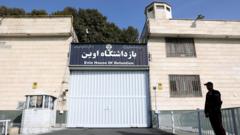**Tensions escalate as both Iran and Israel exchange strikes after a cease-fire announcement by President Trump, while diplomatic efforts continue.**
**Cease-Fire Efforts Between Iran and Israel Mark New Diplomatic Developments**

**Cease-Fire Efforts Between Iran and Israel Mark New Diplomatic Developments**
**Iran confirms cease-fire following U.S. President Trump's announcement amid ongoing tensions.**
Reports from recent events reveal a major diplomatic engagement between Iran and Israel triggered by the announcement of a cease-fire by U.S. President Donald Trump. The cease-fire follows a week-long exchange of missile strikes, during which both countries have faced significant military actions, including U.S. bombers attacking Iranian nuclear facilities.
On Tuesday morning in Tehran, Iranian Foreign Minister Abbas Araghchi confirmed on social media that a cease-fire had begun, asserting that Iran's military had fought “until the very last minute.” However, shortly after this confirmation, an Israeli military spokesman refused to comment, suggesting confusion around the agreement's acceptance. As the cease-fire was announced, Israeli forces continued retaliatory strikes against Iranian targets in a notable escalation of the conflict.
Despite the provocative actions of both sides, President Trump proclaimed on social media that the cease-fire was fully agreed upon, urging for a de-escalation that would unfold in phases. He asserted that military engagements would be wound down gradually but reminded both countries of their responsibility to halt ongoing attacks.
The cease-fire’s potential was further complicated by Iran's missile strike on Al Udeid Air Base in Qatar, the U.S.'s largest military presence in the region. While no casualties were reported from this retaliatory attack, it raised alarms in regional security.
Iran's strategy appeared focused on minimizing damage and avoiding further retaliations while maintaining military readiness. The exchange of fire persisted as both countries cycled through a delicate balance of political statements and military actions. Observers note that Iran has often provided forewarnings prior to retaliatory strikes as a calculated approach to limit collateral damage.
Trump's announcement surprisingly caught many in his administration off guard and few details of the cease-fire agreement have been disclosed. Diplomats suggested that Qatar played a mediating role in facilitating negotiations, presenting a crucial effort to bring both parties toward a diplomatic resolution.
The unfolding developments have cast a shadow over economic markets. Oil prices dropped significantly following the latest missile attacks, reflecting investors' cautious optimism about potential stability in the Middle East.
Calls for lasting peace continue as diplomatic engagements intensify amid military escalations, with analysts warning of the potential for “unimaginable levels” of violence unless a clear diplomatic avenue is pursued. The situation remains fluid, as the international community watches closely for further developments in the region.





















